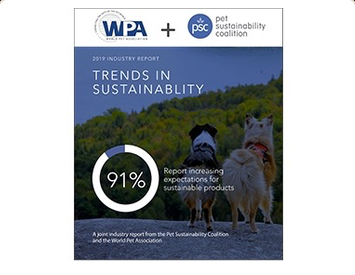The WPA and PLC Release First Industry Report on Sustainability
The WPA and PLC Release First Industry Report on Sustainability
The World Pet Association (WPA) and the Pet Sustainability Coalition (PSC) released the first ever industry report that focuses specifically on sustainability in the pet sector, highlighting rapidly advancing business opportunities for environmentally and socially friendly pet product companies.
This new report, analyzing over 225 responses from pet industry professionals, reveals an increase in demand for sustainable products, explores where companies are encountering road blocks to successful sustainability programs and what tools and resources are available within the industry.
To down load the report, use this link.
For a summery of it, see below.
Expectations are increasing
The data shows an increase in pressure on businesses to expand their responsibility strictly from shareholder value to now include demonstrating responsible treatment of the communities and environments where they do business. The expansion in business accountability means that brands are held accountable not just for their own direct business practices, but also the practices of their tier 1, tier 2 and tier 3 suppliers.
Current sustainability programs are ineffective
Only 23 percent of pet industry professionals rank their own sustainability program as effective and 26 percent report that they have no sustainability program at all.
Support is needed to create success
This increase in accountability for businesses is fueling a need for more education to inform the industry about what is expected of them and where their current performance is, tools to ease implementation, and collaborative opportunities, particularly for small businesses that need more leverage to drive systematic improvement in areas that are too large for one company to change on their own.
Coalition member companies show a skew in positive data, reporting much higher access to education and tools, and a higher interest in collaborating, which will be needed for the industry to address bigger sustainability issues, including agricultural impacts as well as equitable labor practices, and the ability to better trace materials and ingredients from extraction to production, retail and end of life.
